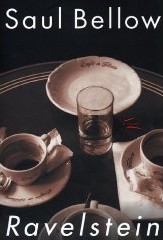 First edition | |
| Author | Saul Bellow |
|---|---|
| Cover artist | Richard Dunkley[1] |
| Language | English |
| Publisher | Viking Press |
Publication date | 24 April 2000 |
| Publication place | United States |
| Media type | Print (Hardback & Paperback) |
| ISBN | 0-670-84134-X (hardback edition) |
| OCLC | 42780381 |
| 813/.52 21 | |
| LC Class | PS3503.E4488 R38 2000 |
| Preceded by | The Actual |
Ravelstein is Saul Bellow's final novel. Published in 2000, when Bellow was eighty-five years old, it received widespread critical acclaim. It tells the tale of a friendship between a university professor and a writer, and the complications that animate their erotic and intellectual attachments in the face of impending death. The novel is a roman à clef written in the form of a memoir. The narrator is in Paris with Abe Ravelstein, a renowned professor, and Nikki, his lover. Ravelstein, who is dying, asks the narrator to write a memoir about him after he dies. After his death, the narrator and his wife go on holiday to the Caribbean. The narrator catches a tropical disease and flies back to the United States to convalesce. Eventually, on recuperation, he decides to write the memoir.
The title character, Ravelstein, is based on the philosopher Allan Bloom, who taught alongside Bellow at the University of Chicago's Committee on Social Thought. Remembering Bloom in an interview, Bellow said, "Allan inhaled books and ideas the way the rest of us breathe air. ... People only want the factual truth. Well, the truth is that Allan was a very superior person, great-souled. When critics proclaim the death of the novel, I sometimes think they are really saying that there are no significant people to write about", but "Allan was certainly one."[2]
- ^ Modern First Editions - a set on Flickr
- ^ "The Wordly Mystic's Late Bloom" James Wood, The Guardian, Saturday 15 April 2000